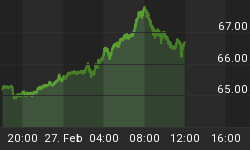The name of the game these days is finding ways around crippling US sanctions, and Russia is the king of pre-emptive thinking.
Right now, reports are emerging that its biggest banks are scheming to maintain access to the global financial system in the event of sanctions.
Working together, Russia’s biggest banks could help each other maintain access to dollars, among other major currencies, and while it wouldn’t be a full fix to sanctions, it could at least head off a panic and a run on banks, Reuters reports.
And Russia’s banks have every reason to be nervous. It comes on the heels of fresh U.S. sanctions on Russia’s Evrofinance Mosnarbank, which the U.S. Treasury Department has targeted for helping to keep the Maduro regime afloat in Venezuela. More specifically, the Russian bank is accused of helping Venezuela’s state-owned PDVSA oil company bust sanctions, Reuters reported in a separate story.
The problem is that Evrofinance Mosnarbank is 25-percent owned by Gazprombank and 25-percent owned by VTB bank—both very heavy hitters on the Russian banking scene.
In late January, the U.S. moved to sanction PDVSA, blocking its $7 billion in assets and interests and prohibiting any deals with the company.
While banks are busy with pre-emptive moves in case of more sanctions, the Kremlin is busy vowing to protect its investments in Venezuela and vowing to take action against anyone who threatens those.
At last count, Russian giant Rosneft had given PDVSA $6.5 billion in loans that were to be repaid in future crude deliveries.
Related: Why Twitter's CEO Is Backing A New Bitcoin Boom
Now, the opposition, self-declared “president-in-charge” vying with Maduro is talking about de-nationalizing the country’s oil industry, which would lead to enormous losses for Russia. That’s basically fishing for non-Maduro money from foreign oil companies.
Back to Russian bank sanctions and that looming threat, it’s worth noting that Russian banks haven’t fared too badly in sanctions past: They switched strategy to focus more on retail banking and state-backed investments, which was paying off by the third-fourth quarter of last year.
It’s also no problem when the legal workarounds don’t work, either. Earlier this month, the Sarajevo-based Organized Crime and Corruption Reporting Project (OCCRP) released details of how Russian banks secretly moved billions around the world through the “Troika Dialog”. The group is said to have laundered nearly $9 billion for corrupt politicians and organized crime figures, and helped them evade taxes, hide assets abroad—and much more.
What has now been dubbed the “Troika Laundromat” operated from 2006 to early 2013 and included some 75 interconnected offshore companies.
Venezuela is just the latest round of Russia-related sanctions.
Related: Lending: The Good, Bad, And Ugly
Earlier this month, Trump extended sanctions against Russia over the annexation of Crimea for another year. Those sanctions were initially put in place by Obama in 2014 and involved the imposition of travel bans and asset freezes against individuals involved in the annexation. Since then, they have been expanded.
On the flip side, in January, Trump lifted sanctions on three Russian companies linked to oligarch Oleg Derispaska.
But Venezuela is quite another matter; and cutting Russia’s biggest banks off from the global financial system would be devastating. Russia may be the king of weaning itself and its allies off the dollar, but they’re not their yet.
ByTom Kool for Safehaven.com
















